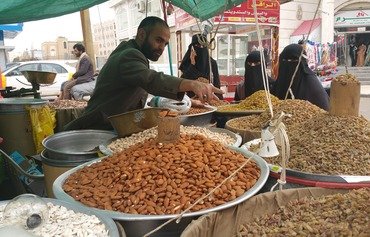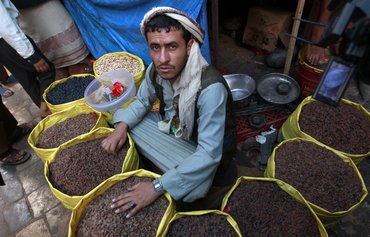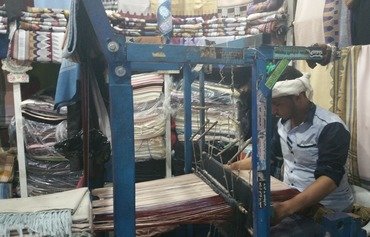Yemenis celebrating the holy month of Ramadan amid the ongoing war are facing both a steep increase in prices and a decline in purchasing power.
Due in part to the 18-month suspension of government salaries, markets are seeing fewer shoppers than in previous years, said Sanaa Supermarket and Spices manager Sadeq al-Thawabi.
Most shoppers are limiting their purchases to basic and essential food items, and are purchasing them in smaller quantities than before, he told Al-Mashareq.
"In the past, we used to be stiflingly overcrowded with shoppers," he said.
The supermarket used to take on additional staff to cope with the increase in sales activity, which "used to peak the day before and the first day of Ramadan", he added.
Al-Thawabi attributed the drop in demand to the rise in prices, high exchange rate of foreign currencies against the riyal and the suspension of salaries.
"We are having difficulty getting domestic gas and transportation costs are high," said Saleh Hassan, who also complained about the high prices of goods.
Hassan told Al-Mashareq his family relies on remittances from his son, who lives outside the country, but said the amount he receives "is no longer enough to cover our food and medicine needs, in contrast to previous years".
Sadiq al-Ashaari, who has worked as an electronic engineer in the private sector since the suspension of his government salary, said he has purchased Ramadan goods from alternative markets that have popped up across Sanaa.
These markets sell goods at a heavily discounted price, he told Al-Mashareq, but the lack of regulation means many are being sold past their expiration date.
Counterfeit goods
Counterfeit goods -- from cosmetics to electronics and auto parts -- now account for about 60% of the volume of commercial activity in the Yemeni market, according to the Yemeni Association for Consumer Protection.
"The increase in consumers’ needs with the advent of the month of Ramadan led some to sell products that do not meet applicable specifications," association president Fadel Mansour told Al-Mashareq.
Many products are sold very close to their expiration date, he said, with some expired products re-packaged in cans with no expiration dates printed on them.
In this way, merchants are exploiting consumers' circumstances, he said.
"The low level of oversight and lack of legal action against those who engage in such practices encouraged the spread of this phenomenon," Mansour said.
This is in addition to the scarcity and high price of basic food items, he noted.
"We have developed a consumer awareness programme for the month of Ramadan with a focus on food safety and consumer rights," he said, adding that this will run in co-ordination with local radio and television stations.
Low purchasing power
"The drop in the value of the Yemeni riyal against hard currencies to less than half has weakened purchasing power," said economist Abdul Jalil Hassan.
Yemen imports more than 90% of its food, and this is a "direct cause of the rise in prices", he told Al-Mashareq, noting that the suspension of the payment of salaries to public sector employees has compounded the suffering of citizens.
"The suspension of oversight and regulatory agencies encouraged many to act on their greed and reintroduce expired products to the markets after repackaging them and altering their expiration dates," he said.
These unscrupulous actions can have severe public health consequences, he warned.

![A Yemeni man shops at a store in Sanaa's al-Asbahi district. [Abu Bakr al-Yamani/Al-Mashareq]](/cnmi_am/images/2018/05/24/12742-Yemen-Sanaa-Ramadan-600_384.jpg)







sissies!
Reply1 Comment(s)